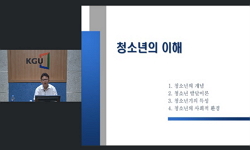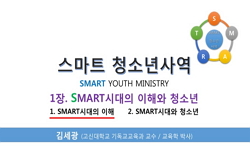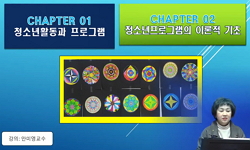Objectives: The purpose of this study was to investigate the relationship between emotional awareness and psychological well-being in adolescents with cognitive emotion regulation strategies as mediators. Methods: A total of 375 middle and high sch...
http://chineseinput.net/에서 pinyin(병음)방식으로 중국어를 변환할 수 있습니다.
변환된 중국어를 복사하여 사용하시면 됩니다.
- 中文 을 입력하시려면 zhongwen을 입력하시고 space를누르시면됩니다.
- 北京 을 입력하시려면 beijing을 입력하시고 space를 누르시면 됩니다.
https://www.riss.kr/link?id=A106187190
- 저자
- 발행기관
- 학술지명
- 권호사항
-
발행연도
2019
-
작성언어
Korean
- 주제어
-
KDC
598
-
등재정보
KCI우수등재
-
자료형태
학술저널
- 발행기관 URL
-
수록면
13-24(12쪽)
-
KCI 피인용횟수
5
- 제공처
-
0
상세조회 -
0
다운로드
부가정보
다국어 초록 (Multilingual Abstract)
Objectives: The purpose of this study was to investigate the relationship between emotional awareness and psychological well-being in adolescents with cognitive emotion regulation strategies as mediators.
Methods: A total of 375 middle and high school students in Seoul and Gyeonggi-do participated. Self-report questionnaires were used to assess their emotional awareness, adaptive and maladaptive emotion regulation strategies, and psychological well-being. The data were analyzed using descriptive statistics, Pearson’s correlations, and regression analyses in PROCESS macro.
Results: First, emotional awareness was related to both cognitive emotion regulation strategies and psychological well-being. Also, adaptive strategies for regulating emotions were strongly related to psychological well-being, while maladaptive strategies were inversely related to psychological wellbeing.
Second, both adaptive and maladaptive emotion regulation strategies partially mediated the link between emotional awareness and psychological well-being in adolescents.
Conclusions: These findings indicate that emotional awareness and cognitive emotion regulation strategies are important factors in improving the psychological well-being of adolescents.
목차 (Table of Contents)
- Introduction
- Methods
- Results
- Discussion
- References
- Introduction
- Methods
- Results
- Discussion
- References
- 참고문헌
참고문헌 (Reference)
1 안현의, "한국판 인지적 정서조절전략 척도(K-CERQ)의 타당화" 한국상담학회 14 (14): 1773-1794, 2013
2 한민, "한국 청소년들의 행복: 타 연령대와의 비교를 중심으로" 한국청소년학회 19 (19): 217-235, 2012
3 홍승빈, "청소년의 자율성 및 관계성 만족이 심리적 안녕감에 미치는 영향: 개인주의-집합주의 가치관에 따른 차이" 한국아동학회 38 (38): 5-16, 2017
4 송지원, "청소년의 일상적 스트레스가 심리적 안녕감에 미치는 영향: 인지적 정서조절전략의 매개효과" 한국청소년학회 25 (25): 103-129, 2018
5 김혜원, "청소년의 인지적 정서조절전략과 심리적 안녕감의 관계에서 대인관계문제의 매개효과" 한국청소년상담복지개발원 24 (24): 151-171, 2016
6 박정희, "청소년의 심리적 안녕감 척도 개발" 교육연구소 8 (8): 111-135, 2007
7 박미애, "청소년의 심리적 안녕감 요인에 관한 메타분석" 한국재활심리학회 20 (20): 627-652, 2013
8 이미현, "청소년의 성에 따른 완벽주의 및 부모·또래애착이 우울에 미치는 영향" 한국청소년정책연구원 25 (25): 87-112, 2014
9 이지영, "정서조절과 정신병리의 관계: 연구 현황과 과제" 한국상담심리학회 18 (18): 461-493, 2006
10 유안진, "정서조절 양식과 부모 애착이 청소년의 생활만족에 미치는 영향" 한국아동학회 27 (27): 167-181, 2006
1 안현의, "한국판 인지적 정서조절전략 척도(K-CERQ)의 타당화" 한국상담학회 14 (14): 1773-1794, 2013
2 한민, "한국 청소년들의 행복: 타 연령대와의 비교를 중심으로" 한국청소년학회 19 (19): 217-235, 2012
3 홍승빈, "청소년의 자율성 및 관계성 만족이 심리적 안녕감에 미치는 영향: 개인주의-집합주의 가치관에 따른 차이" 한국아동학회 38 (38): 5-16, 2017
4 송지원, "청소년의 일상적 스트레스가 심리적 안녕감에 미치는 영향: 인지적 정서조절전략의 매개효과" 한국청소년학회 25 (25): 103-129, 2018
5 김혜원, "청소년의 인지적 정서조절전략과 심리적 안녕감의 관계에서 대인관계문제의 매개효과" 한국청소년상담복지개발원 24 (24): 151-171, 2016
6 박정희, "청소년의 심리적 안녕감 척도 개발" 교육연구소 8 (8): 111-135, 2007
7 박미애, "청소년의 심리적 안녕감 요인에 관한 메타분석" 한국재활심리학회 20 (20): 627-652, 2013
8 이미현, "청소년의 성에 따른 완벽주의 및 부모·또래애착이 우울에 미치는 영향" 한국청소년정책연구원 25 (25): 87-112, 2014
9 이지영, "정서조절과 정신병리의 관계: 연구 현황과 과제" 한국상담심리학회 18 (18): 461-493, 2006
10 유안진, "정서조절 양식과 부모 애착이 청소년의 생활만족에 미치는 영향" 한국아동학회 27 (27): 167-181, 2006
11 장정주, "정서자각에 기초한 정서표현 훈련이 정서자각, 정서표현, 정서표현의 억제 및 대인관계에 미치는 효과" 한국상담심리학회 23 (23): 861-884, 2011
12 이서정, "정서인식의 명확성과 인지적 정서조절이 정신건강에 미치는 영향" 한국건강심리학회 13 (13): 887-905, 2008
13 임전옥, "정서인식의 명확성,정서조절양식과 심리적 안녕의 관계" 한국상담심리학회 15 (15): 259-275, 2003
14 최은실, "정서인식 및 표현 능력 향상 프로그램의 효과 연구" 한국심리학회 산하 한국발달심리학회 26 (26): 17-39, 2013
15 최해연, "정서강도, 정서주의, 정서명료성, 및 정서표현양가성의 군집과 심리적 적응의 관계" 한국사회및성격심리학회 22 (22): 59-73, 2008
16 김민아, "적응유연한 청소년의 정서인식 명확성과 인지적 정서조절 전략에 관한 연구" 한국청소년상담복지개발원 16 (16): 15-32, 2008
17 김수안, "자신의 감정에 압도된 사람들의성격, 정서특성 및 주관적 안녕감" 한국사회및성격심리학회 20 (20): 45-66, 2006
18 남여명, "외상경험자의 정서인식명확성이 외상 후 성장에 미치는 영향: 적응적 인지적 정서조절전략의 매개효과" 한국상담학회 18 (18): 23-41, 2017
19 김소희, "스트레스 사건, 인지적 정서조절전략과 심리적 안녕감간의 관계" 가톨릭대학교 대학원 2004
20 전선미, "성별에 따른 청소년의 정서처리과정 유형과 심리적 안녕감의 관계" 한국상담학회 12 (12): 1737-1752, 2011
21 임전옥, "상담자의 정서지능과 상담관계 및 성과에 관한 연구" 가톨릭대학교 대학원 2014
22 신주연, "삶의 의미와 정서조절 양식이청소년의 심리적 안녕에 미치는 영향" 한국상담심리학회 17 (17): 1035-1057, 2005
23 박혜민, "마음챙김이 심리적 안녕감에 미치는 영향: 정서조절방략의 매개효과" 한국인지행동치료학회 12 (12): 259-274, 2012
24 이명조, "대학생이 지각한 어머니 양육태도와 정서명확성이 심리적 안녕감에 미치는 영향" 한국상담학회 14 (14): 17-35, 2013
25 김용희, "대학생의 정서 과정 유형과 인지적 정서조절, 주관적 안녕감, 긍정 및 부정정서의 관계" 한국청소년학회 21 (21): 439-461, 2014
26 유순화, "대학생의 인지적 정서조절과 심리적 안녕감 간의 관계" 한국청소년복지학회 16 (16): 183-202, 2014
27 정선영, "대학생의 스트레스 경험이 심리적 안녕감에 미치는 영향: 정서자각의 매개효과를 중심으로" 사단법인 아시아문화학술원 9 (9): 427-440, 2018
28 안진영, "대학생의 수용행동이 심리적 안녕감에 미치는 영향: 인지적 정서조절 전략의 매개효과" 한국청소년복지학회 18 (18): 173-197, 2016
29 최우경, "대학생의 생활스트레스와 자살생각과의 관계: 인지적 정서조절의 조절효과와 매개효과" 한국상담학회 13 (13): 255-272, 2012
30 Sonja Lyubomirsky, "Why are some people happier than others? The role of cognitive and motivational processes in well-being" American Psychological Association (APA) 56 (56): 239-249, 2001
31 Matthew Tyler Boden, "What you are feeling and why: Two distinct types of emotional clarity" Elsevier BV 51 (51): 652-656, 2011
32 Kennedy-Moore, E., "Varieties of nonexpression: A review of self-report measures of emotional control" 1991
33 Lee, S. -J., "The research on the validation of the trait meta-mood scale : The domain exploration of the emotional intelligence" 11 (11): 95-116, 1997
34 Nadia Garnefski, "The relationship between cognitive emotion regulation strategies and emotional problems: comparison between a clinical and a non-clinical sample" Wiley 16 (16): 403-420, 2002
35 Joseph Ciarrochi, "The link between emotion identification skills and socio-emotional functioning in early adolescence: A 1-year longitudinal study" Elsevier BV 31 (31): 565-582, 2008
36 Kim, J., "The influence of character strengths and personality disorders on well-being and depression" 1 (1): 1-19, 2015
37 Saarni, C., "The handbook of emotional intelligence: Theory, development, assessment and application at home, school, and in the workplace" Jossey-Bass 68-91, 2000
38 Yun, K. -H., "The effects of temperament and parenting affective attitude, social supports on their subjective well-being of middle school students" 7 : 59-78, 2016
39 Chi-Sum Wong, "The effects of leader and follower emotional intelligence on performance and attitude: An exploratory study" Elsevier BV 13 (13): 243-274, 2002
40 Alan Swinkels, "The Measurement and Conceptualization of Mood Awareness: Monitoring and Labeling One's Mood States" SAGE Publications 21 (21): 934-949, 2016
41 Lisa Feldman Barrett, "The Experience of Emotion" Annual Reviews 58 (58): 373-403, 2007
42 Nadia Garnefski, "Specificity of relations between adolescents’ cognitive emotion regulation strategies and symptoms of depression and anxiety" Informa UK Limited 32 (32): 1401-1408, 2017
43 Nadia Garnefski, "Specificity of relations between adolescents’ cognitive emotion regulation strategies and Internalizing and Externalizing psychopathology" Elsevier BV 28 (28): 619-631, 2005
44 Amelia Aldao, "Specificity of cognitive emotion regulation strategies: A transdiagnostic examination" Elsevier BV 48 (48): 974-983, 2010
45 Soheila Panahi, "Predictors of Psychological Well-being among Malaysian Graduates" Cognitive-crcs 16 (16): 2067-2083, 2016
46 Mahmoudzadeh, S., "Prediction of psychological well-being based on dispositional mindfulness and cognitive emotion regulation strategies in students" 3 (3): 193-200, 2015
47 Natalio Extremera, "Perceived emotional intelligence and life satisfaction: Predictive and incremental validity using the Trait Meta-Mood Scale" Elsevier BV 39 (39): 937-948, 2005
48 Richard G. Heimberg, "Partner similarity mediates interpersonal anxiety" Springer Science and Business Media LLC 9 (9): 443-453, 1985
49 Joseph Ciarrochi, "On being aware and accepting: A one-year longitudinal study into adolescent well-being" Elsevier BV 34 (34): 695-703, 2011
50 N Garnefski, "Negative life events, cognitive emotion regulation and emotional problems" Elsevier BV 30 (30): 1311-1327, 2001
51 Lisa Feldman Barrett, "Knowing what you're feeling and knowing what to do about it: Mapping the relation between emotion differentiation and emotion regulation" Informa UK Limited 15 (15): 713-724, 2001
52 Hayes, A. F., "Introduction to mediation, moderation, and conditional process analysis: A regression-based approach" Shinyoungsa 2015
53 Hayes, A. F., "Introduction to mediation, moderation, and conditional process analysis: A regression-based approach" Guilford Publications 2017
54 Jennifer M. Eastabrook, "Internalizing Symptoms in Female Adolescents: Associations with Emotional Awareness and Emotion Regulation" Springer Science and Business Media LLC 23 (23): 487-496, 2014
55 Susan Penza-Clyve, "Initial Validation of the Emotion Expression Scale for Children (EESC)" Informa UK Limited 31 (31): 540-547, 2002
56 Jürgen H. Otto, "Individual Differences in Emotional Clarity and Complex Problem Solving" SAGE Publications 25 (25): 3-24, 2006
57 S. Balzarotti, "Individual Differences in Cognitive Emotion Regulation: Implications for Subjective and Psychological Well-Being" Springer Science and Business Media LLC 17 (17): 125-143, 2016
58 Carol D. Ryff, "Happiness is everything, or is it? Explorations on the meaning of psychological well-being" American Psychological Association (APA) 57 (57): 1069-1081, 1989
59 Carol L. Gohm, "Four latent traits of emotional experience and their involvement in well-being, coping, and attributional style" Informa UK Limited 16 (16): 495-518, 2002
60 Andrew A. Abeyta, "Finding meaning through emotional understanding: emotional clarity predicts meaning in life and adjustment to existential threat" Springer Science and Business Media LLC 39 (39): 973-983, 2015
61 Dante Cicchetti, "Emotions and emotion regulation in developmental psychopathology" Cambridge University Press (CUP) 7 (7): 1-10, 1995
62 Ross A. Thompson, "Emotional regulation and emotional development" Springer Science and Business Media LLC 3 (3): 269-307, 1991
63 John D. Mayer, "Emotional intelligence as a standard intelligence" American Psychological Association (APA) 1 (1): 232-242, 2001
64 Peter Salovey, "Emotional intelligence" SAGE Publications 9 (9): 185-211, 2016
65 Gross, J. J., "Emotion regulation : Affective, cognitive, and social consequences" 39 (39): 281-291, 2002
66 José M. Augusto-Landa, "Does Perceived Emotional Intelligence and Optimism/pessimism Predict Psychological Well-being?" Springer Science and Business Media LLC 12 (12): 463-474, 2011
67 Kim, S. -H., "A study on relationships among the stressful events, cognitive emotion regulation strategies and psychological well-being" 26 : 5-29, 2008
68 Ryff, C. D., "A psychology of human strengths: Fundamental questions and future directions for a positive psychology" American Psychological Association 271-287, 2003
동일학술지(권/호) 다른 논문
-
- 한국아동학회
- 김선엽(Seon Yeop Kim)
- 2019
- KCI우수등재
-
- 한국아동학회
- 이영애(Young Ae Lee)
- 2019
- KCI우수등재
-
다문화가정 아동과 일반가정 아동의 부모화 경험이 내재화 문제에 미치는 영향 비교
- 한국아동학회
- 이지선(Ji Seon Lee)
- 2019
- KCI우수등재
-
어머니의 양육행동이 걸음마기 아동의 외현화 문제행동에 미치는 영향
- 한국아동학회
- 박보경(Bokyung Park)
- 2019
- KCI우수등재
분석정보
인용정보 인용지수 설명보기
학술지 이력
| 연월일 | 이력구분 | 이력상세 | 등재구분 |
|---|---|---|---|
| 2022 | 평가예정 | 계속평가 신청대상 (등재유지) | |
| 2017-01-01 | 평가 | 우수등재학술지 선정 (계속평가) | |
| 2013-01-01 | 평가 | 등재학술지 유지 (등재유지) |  |
| 2010-01-01 | 평가 | 등재학술지 유지 (등재유지) |  |
| 2008-01-01 | 평가 | 등재학술지 유지 (등재유지) |  |
| 2006-01-01 | 평가 | 등재학술지 유지 (등재유지) |  |
| 2005-03-22 | 학술지명변경 | 외국어명 : 미등록 -> Korean Journal of Child Studies |  |
| 2003-01-01 | 평가 | 등재학술지 선정 (등재후보2차) |  |
| 1998-07-01 | 평가 | 등재후보학술지 선정 (신규평가) |  |
학술지 인용정보
| 기준연도 | WOS-KCI 통합IF(2년) | KCIF(2년) | KCIF(3년) |
|---|---|---|---|
| 2016 | 1.76 | 1.76 | 1.79 |
| KCIF(4년) | KCIF(5년) | 중심성지수(3년) | 즉시성지수 |
| 1.85 | 1.77 | 2.219 | 0.21 |






 DBpia
DBpia






